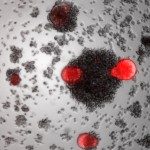Link to Pubmed [PMID] – 17035335
J. Virol. 2006 Dec;80(24):12102-8
The APOBEC3 protein family can constitute a potent barrier to the successful infection of mammalian species by retroviruses. Therefore, any retrovirus that has evolved the ability to replicate in a given animal must have developed mechanisms that allow it to avoid or inhibit the APOBEC3 proteins expressed in that animal. Here, we demonstrate that Mason-Pfizer monkey virus (MPMV) is resistant to inhibition by the APOBEC3G protein expressed in its normal host, the rhesus macaque, but highly susceptible to inhibition by murine APOBEC3 (mA3). MPMV virion particles fail to package rhesus APOBEC3G (rA3G), and MPMV Gag binds rA3G poorly in coexpressing cells. In contrast, MPMV virions package mA3 efficiently and MPMV Gag-mA3 complexes are readily detected. Moreover, mA3, but not rA3G, partially colocalizes with MPMV Gag in the cytoplasm of coexpressing cells. Previously, we have demonstrated that murine leukemia virus also escapes inhibition by APOBEC3 proteins by avoiding virion incorporation of its cognate APOBEC3 protein, mA3, yet is inhibited by primate APOBEC3G proteins, which it packages effectively (B. P. Doehle, A. Schäfer, H. L. Wiegand, H. P. Bogerd, and B. R. Cullen, J. Virol. 79:8201-8207, 2005). The finding that two essentially unrelated beta- and gammaretroviruses use similar mechanisms to escape inhibition by the APOBEC3 proteins found in their normal host species suggests that the selective exclusion of APOBEC3 proteins from virion particles may be a general mechanism used by simple mammalian retroviruses.

